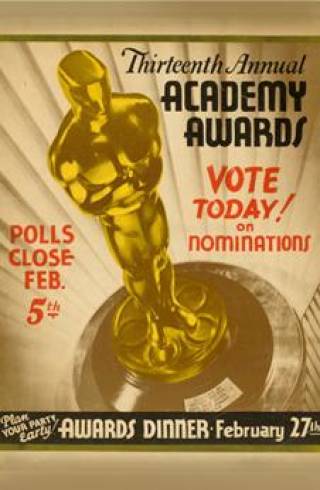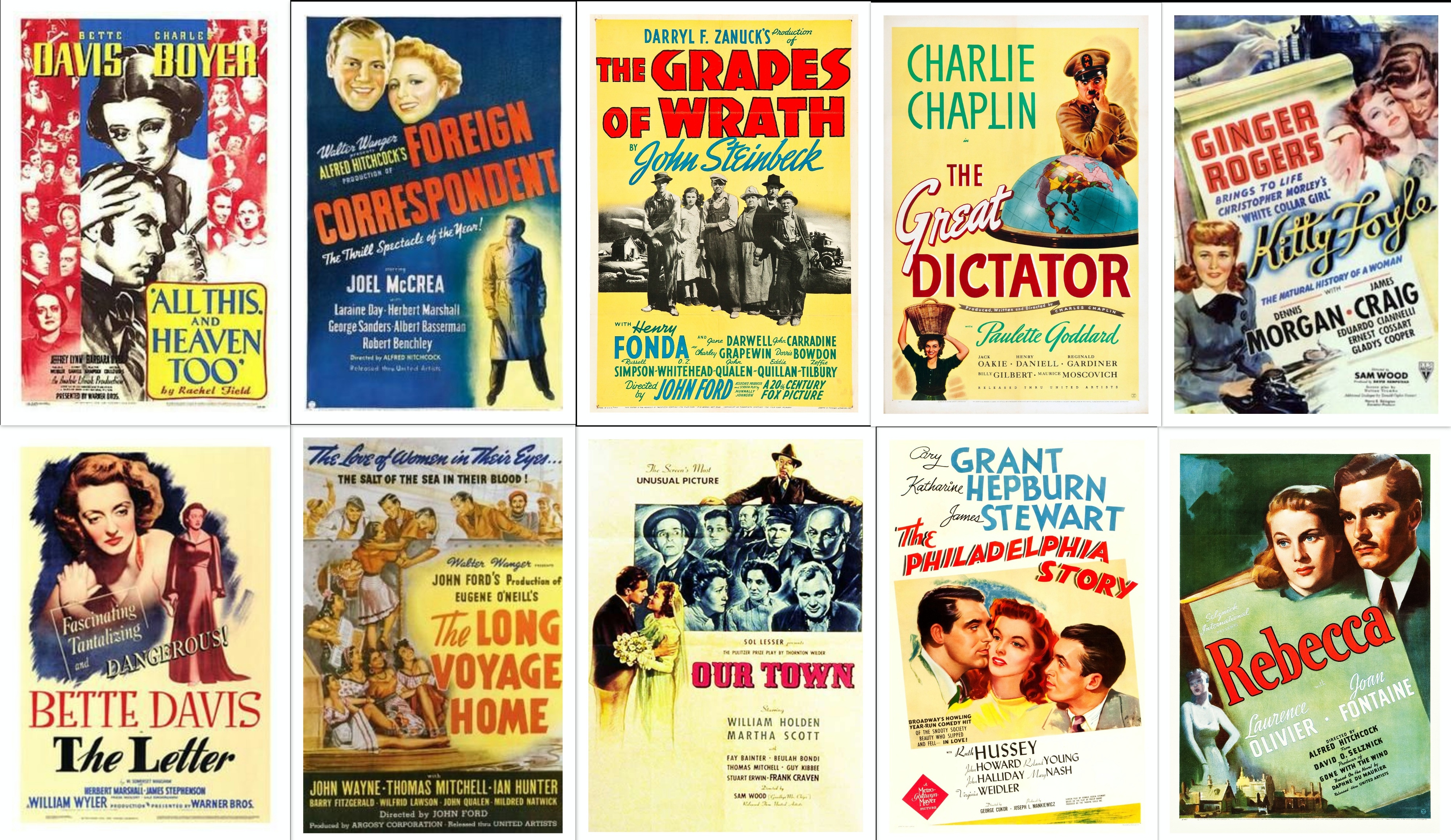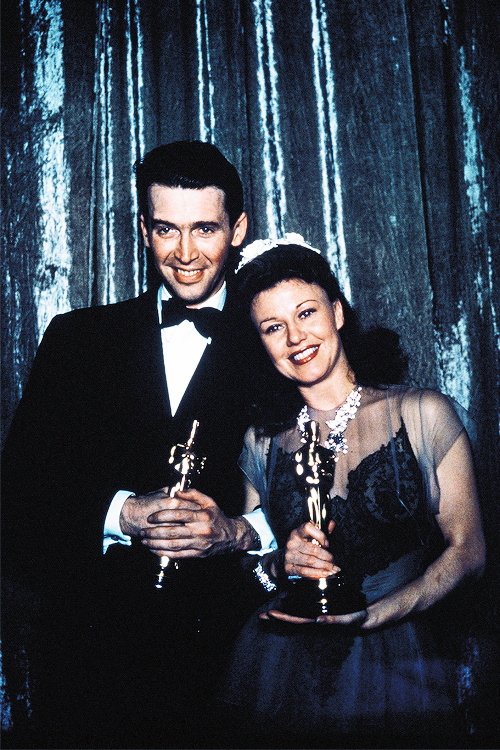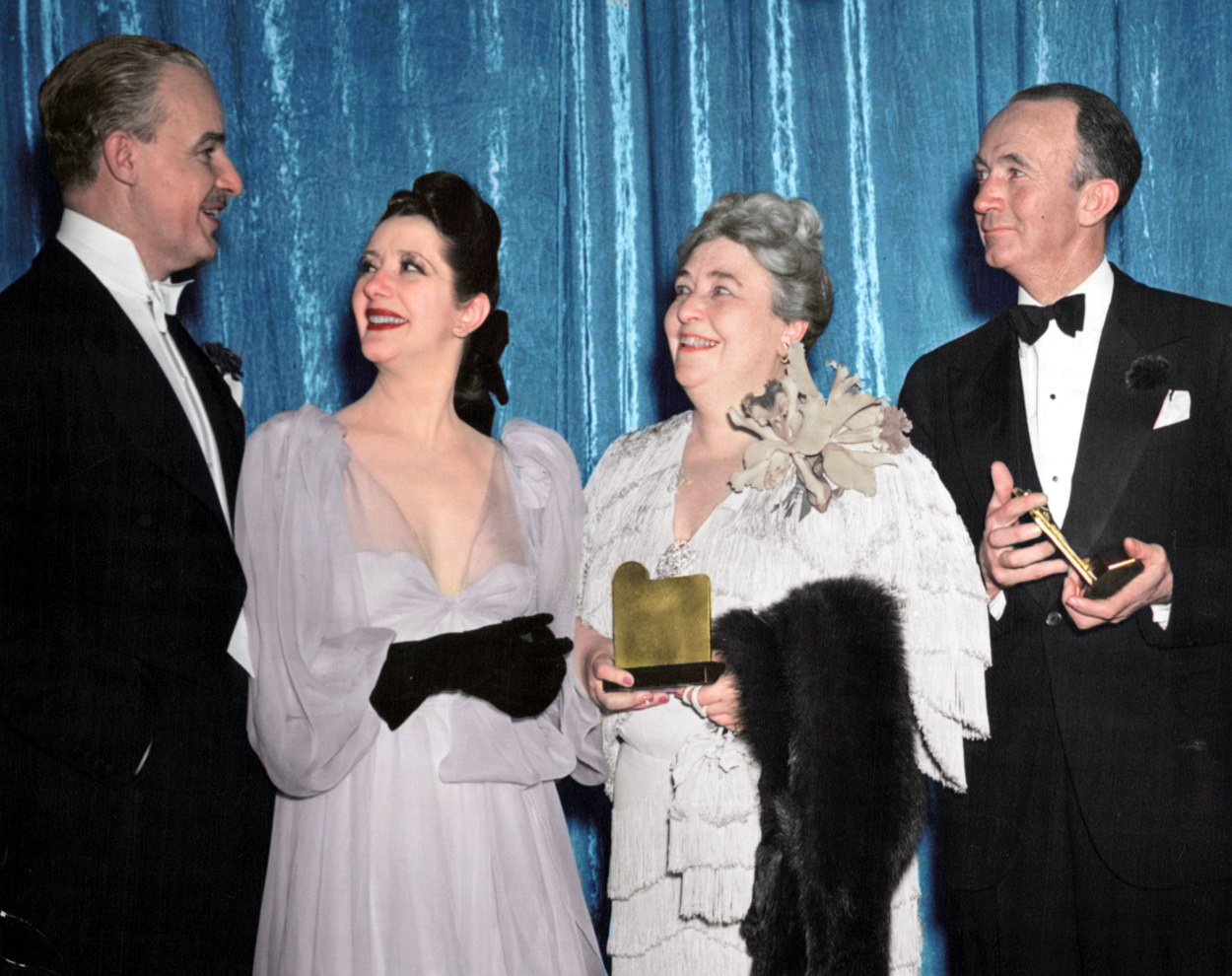
The 13th Academy Awards honors the best in film for 1940. The ceremony (with comedian Bob Hope as the host as he was in last year’s ceremonies) will be held on February 27, at Biltmore Bowl, Biltmore Hotel in Los Angeles.
The nominations are listed below:

Outstanding Production
- All This, and Heaven Too – Warner Bros.
- Foreign Correspondent – Walter Wanger Productions and United Artists
- The Grapes of Wrath – 20th Century Fox
- The Great Dictator – Charlie Chaplin Productions and United Artists
- Kitty Foyle – RKO Radio
- The Letter – Warner Bros.
- The Long Voyage Home – Argosy Films, Walter Wanger Productions, and United Artists
- Our Town – Sol Lesser Productions and United Artists
- The Philadelphia Story – Metro-Goldwyn-Mayer
- Rebecca – Selznick International and United Artists
Best Director
- George Cukor – The Philadelphia Story
- John Ford – The Grapes of Wrath
- Alfred Hitchcock – Rebecca
- Sam Wood – Kitty Foyle
- William Wyler – The Letter
Best Actor
- Charlie Chaplin – The Great Dictator
- Henry Fonda – The Grapes of Wrath
- Raymond Massey – Abe Lincoln in Illinois
- Laurence Olivier – Rebecca
- James Stewart – The Philadelphia Story
Best Actress
- Bette Davis – The Letter
- Joan Fontaine – Rebecca
- Katharine Hepburn – The Philadelphia Story
- Ginger Rogers – Kitty Foyle
- Martha Scott – Our Town
Best Supporting Actor
- Albert Bassermann – Foreign Correspondent
- Walter Brennan – The Westerner
- William Gargan – They Knew What They Wanted
- Jack Oakie – The Great Dictator
- James Stephenson – The Letter
Best Supporting Actress
- Judith Anderson – Rebecca
- Jane Darwell – The Grapes of Wrath
- Ruth Hussey – The Philadelphia Story
- Barbara O’Neil – All This, and Heaven Too
- Marjorie Rambeau – Primrose Path
Best Original Screenplay
- Angels Over Broadway – Ben Hecht
- Dr. Ehrlich’s Magic Bullet – Norman Burnstine, Heinz Herald, John Huston
- Foreign Correspondent – Charles Bennett, Joan Harrison
- The Great Dictator – Charlie Chaplin
- The Great McGinty – Preston Sturges
Best Screenplay
- The Grapes of Wrath – Nunnally Johnson, based on the novel by John Steinbeck
- Kitty Foyle – Dalton Trumbo, based on the novel by Christopher Morley
- The Long Voyage Home – Dudley Nichols, based on the plays The Moon of the Caribees, In the Zone, Bound East for Cardiff, and The Long Voyage Home by Eugene O’Neill
- The Philadelphia Story – Donald Ogden Stewart, based on the play by Philip Barry
- Rebecca – Robert E. Sherwood, Joan Harrison, based on the novel by Daphne du Maurier
Best Original Story
- Arise, My Love – Benjamin Glazer, John S. Toldy
- Comrade X – Walter Reisch
- Edison, the Man – Hugo Butler, Dore Schary
- My Favorite Wife – Leo McCarey, Samuel Spewack, Bella Spewack
- The Westerner – Stuart N. Lake
Best Live Action Short Subject, One-Reel
- London Can Take It! – Warner Bros.
- More About Nostradamus – Metro-Goldwyn-Mayer
- Quicker’n a Wink – Pete Smith and Metro-Goldwyn-Mayer
- Siege – RKO Radio
Best Live Action Short Subject, Two-Reel
- Eyes of the Navy – Metro-Goldwyn-Mayer
- Service with the Colors – Warner Bros.
- Teddy, the Rough Rider – Warner Bros.
Best Short Subject – Cartoons
- The Milky Way – Metro-Goldwyn-Mayer
- Puss Gets the Boot – Metro-Goldwyn-Mayer
- A Wild Hare – Leon Schlesinger and Warner Bros.
Best Original Score
- Arizona – Victor Young
- Dark Command – Victor Young
- The Fight for Life – Louis Gruenberg
- The Great Dictator – Meredith Willson
- The House of the Seven Gables – Frank Skinner
- The Howards of Virginia – Richard Hageman
- The Letter – Max Steiner
- The Long Voyage Home – Richard Hageman
- The Mark of Zorro – Alfred Newman
- My Favorite Wife – Roy Webb
- North West Mounted Police – Victor Young
- One Million B.C. – Werner R. Heymann
- Our Town – Aaron Copland
- Pinocchio – Leigh Harline, Paul Smith, Ned Washington
- Rebecca – Franz Waxman
- The Thief of Bagdad – Miklós Rózsa
- Waterloo Bridge – Herbert Stothart
Best Scoring
- Arise, My Love – Victor Young
- Hit Parade of 1941 – Cy Feuer
- Irene – Anthony Collins
- Our Town – Aaron Copland
- The Sea Hawk – Erich Wolfgang Korngold
- Second Chorus – Artie Shaw
- Spring Parade – Charles Previn
- Strike Up the Band – Georgie Stoll, Roger Edens
- Tin Pan Alley – Alfred Newman
Best Original Song
- “Down Argentine Way” from Down Argentine Way – Music by Harry Warren; Lyrics by Mack Gordon
- “I’d Know You Anywhere” from You’ll Find Out – Music by Jimmy McHugh; Lyrics by Johnny Mercer
- “It’s a Blue World” from Music in My Heart – Music and Lyrics by Chet Forrest and Bob Wright
- “Love of My Life” from Second Chorus – Music by Artie Shaw; Lyrics by Johnny Mercer
- “Only Forever” from Rhythm on the River – Music by James V. Monaco; Lyrics by Johnny Burke
- “Our Love Affair” from Strike Up the Band – Music and Lyrics by Roger Edens and Arthur Freed
- “Waltzing in the Clouds” from Spring Parade – Music by Robert Stolz; Lyrics by Gus Kahn
- “When You Wish Upon a Star” from Pinocchio – Music by Leigh Harline; Lyrics by Ned Washington
- “Who Am I?” from Hit Parade of 1941 – Music by Jule Styne; Lyrics by Walter Bullock
Best Sound Recording
- Behind the News – Charles L. Lootens
- Captain Caution – Elmer Raguse
- The Grapes of Wrath – E. H. Hansen
- The Howards of Virginia – Jack Whitney
- Kitty Foyle – John O. Aalberg
- North West Mounted Police – Loren L. Ryder
- Our Town – Thomas T. Moulton
- The Sea Hawk – Nathan Levinson
- Spring Parade – Bernard B. Brown
- Strike Up the Band – Douglas Shearer
- Too Many Husbands – John P. Livadary
Best Art Direction, Black-and-White
- Arise, My Love – Hans Dreier, Robert Usher
- Arizona – Lionel Banks, Robert Peterson
- The Boys from Syracuse – John Otterson
- Dark Command – John Victor Mackay
- Foreign Correspondent – Alexander Golitzen
- Lillian Russell – Richard Day, Joseph C. Wright
- My Favorite Wife – Van Nest Polglase, Mark-Lee Kirk
- My Son, My Son! – John DuCasse Schulze
- Pride and Prejudice – Cedric Gibbons, Paul Groesse
- Our Town – Lewis J. Rachmil
- Rebecca – Lyle R. Wheeler
- The Sea Hawk – Anton Grot
- The Westerner – James Basevi
Best Art Direction, Color
- Bitter Sweet – Cedric Gibbons, John S. Detlie
- Down Argentine Way – Richard Day, Joseph C. Wright
- North West Mounted Police – Hans Dreier, Roland Anderson
- The Thief of Bagdad – Vincent Korda
Best Cinematography, Black-and-White
- Abe Lincoln in Illinois – James Wong Howe
- All This, and Heaven Too – Ernest Haller
- Arise, My Love – Charles Lang
- Boom Town – Harold Rosson
- Foreign Correspondent – Rudolph Maté
- The Letter – Tony Gaudio
- The Long Voyage Home – Gregg Toland
- Rebecca – George Barnes
- Spring Parade – Joseph Valentine
- Waterloo Bridge – Joseph Ruttenberg
Best Cinematography, Color
- Bitter Sweet – Oliver T. Marsh, Allen Davey
- The Blue Bird – Arthur C. Miller, Ray Rennahan
- Down Argentine Way – Leon Shamroy, Ray Rennahan
- North West Mounted Police – Victor Milner, W. Howard Greene
- Northwest Passage – Sidney Wagner, William V. Skall
- The Thief of Bagdad – Georges Périnal
Best Film Editing
- The Grapes of Wrath – Robert L. Simpson
- The Letter – Warren Low
- The Long Voyage Home – Sherman Todd
- North West Mounted Police – Anne Bauchens
- Rebecca – Hal C. Kern
Best Special Effects
- The Blue Bird – Fred Sersen, Edmund H. Hansen
- Boom Town – A. Arnold Gillespie, Douglas Shearer
- The Boys from Syracuse – John P. Fulton, Bernard B. Brown, Joe Lapis
- Dr. Cyclops – Farciot Edouart, Gordon Jennings
- Foreign Correspondent – Paul Eagler, Thomas T. Moulton
- The Invisible Man Returns – John P. Fulton, Bernard B. Brown, William Hedgcock
- The Long Voyage Home – R. T. Layton, Ray Binger, Thomas T. Moulton
- One Million B.C. – Roy Seawright, Elmer A. Raguse
- Rebecca – Jack Cosgrove, Arthur Johns
- The Sea Hawk – Byron Haskin, Nathan Levinson
- Swiss Family Robinson – Vernon L. Walker, John O. Aalberg
- The Thief of Bagdad – Lawrence W. Butler, Jack Whitney
- Typhoon – Farciot Edouart, Gordon Jennings, Loren L. Ryder
- Women in War – Howard J. Lydecker, William Bradford, Ellis J. Thackery, Herbert Norsch

